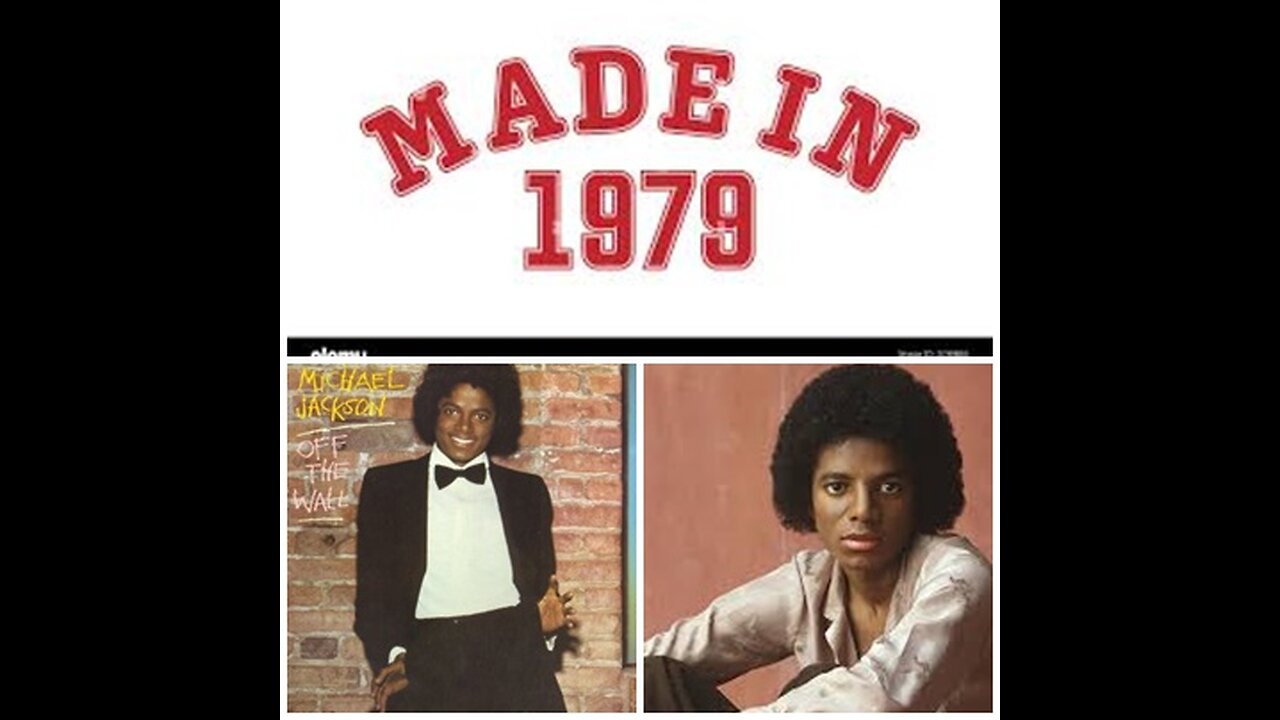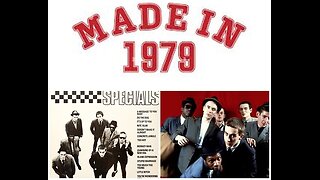Premium Only Content

My Top 20 albums for 1979 No 12
Michael Jackson Off the Wall Pop/R&B
February 24 2016
Off the Wall is the sound of young Michael Jackson's liberation. Though he would become even more successful in the '80s, Off the Wall remains unabashedly fun to return to for its joy and lack of baggage. For 41 minutes, we can live in the eternally young Neverland Michael longed for, a universe largely without consequence or death.
In the summer of 1976, a variety show called "The Jacksons" debuted on CBS. The program came about during a relatively fallow period for the showbiz brood, after the Jackson 5 ignited nationwide fervor with hits like "ABC" and "I’ll Be There" but before Michael Jackson set out for solo superstardom. Their future success seemed in doubt, and the show-with its glaring lights, sparkling costumes, and rampant cheesiness-was a Vegas-style extravaganza that played to well-worn pleasures. One recurring segment called "On the Wall" saw Michael inviting various guest hosts to sign a fake brick facade and do a little dance before everyone eventually ended up in a frozen ta-dah! pose. Though Michael was all smiles on "The Jacksons," he later claimed that he "hated every minute" of it. During the show’s year-long run, he was smack in the middle of gangly teenagedom, acne and all. Raised in the limelight by an infamously strict father, Michael was painfully self-conscious, worried that he might never be able to shake his child stardom. He didn’t want to merely cling to his family’s fading notoriety. He wanted to break away from it completely.
Off the Wall is the sound of that liberation. And he knew exactly what he was doing. On November 6, 1979, just as the album was starting to take off, Michael wrote a note to himself on the back of a tour itinerary, a proclamation of self so ambitious it could make Kanye blush. "MJ will be my new name, no more Michael Jackson. I want a whole new character, a whole new look, I should be a totally different person. People should never think of me as the kid who sang ‘ABC’ [and] ‘I Want You Back,’" he jotted down. "I should be a new incredible actor singer dancer that will shock the world. I will do no interviews. I will be magic. I will be a perfectionist, a researcher, a trainer, a masterer… I will study and look back on the whole world of entertainment and perfect it. Take it steps further from where the greats left off."
Those words were eerily prescient in many ways, of course, but they also highlight one of Michael’s most important dualities: He wanted to be magical-to defy expectation and reality-but he knew that such skills could not materialize from thin air. He understood that exceptionalism took hard work. Growing up in the Motown system, he would often sit in on sessions, soaking up lessons from the greats: Diana Ross, Marvin Gaye, the Temptations. He studied the way James Brown, Sammy Davis Jr., and Fred Astaire moved their feet onstage, in movies, and on TV. At 17, he counted hallowed masters like Irving Berlin, George Gershwin, and Duke Ellington among his favorite songwriters. He had released four solo albums in the early ’70s, but Off the Wall, which came out when he was 21, finally allowed him to flex all those hours of research into something that was his.
It also marked a moment of idealism. Around the time of Off the Wall, Michael’s musical and physical changes felt natural-joyous extensions of the black American experience. Disco was overwhelmingly popular, breaking down color lines and radio formats while offering utopia on the dancefloor. Coming from the segregated, working-class city of Gary, Ind., Jackson's achievements and acceptance represented a rosy view of the country’s future. But 1979 was scarred by the beginning of the quasi-racist "disco sucks" backlash; Michael also got his first nose job that year, narrowing his nostrils. And though he would become even more successful in the '80s, those astronomical heights sometimes catered to white tastes-in both appearance and sound-in a way that could seem effortful, cynical, and sad.
So part of the reason why Off the Wall remains so unabashedly fun to return to involves that lack of baggage. For 41 minutes, we can live in the eternally young Neverland Michael longed for, a universe largely without consequence or death. This lasting affection is reiterated by a new Spike Lee documentary, Michael Jackson's Journey from Motown to Off the Wall, which is included in this CD/DVD reissue and finds Jackson family members and associates, along with more modern stars like the Weeknd’s Abel Tesfaye, ?uestlove, and Pharrell, paying tribute to Michael’s earliest incarnations. "Off the Wall was definitely the one that made me feel like I could sing," says Tesfaye in the doc, which was in part produced by executors of Michael’s estate and barely mentions anything about the artist’s life after Off the Wall.
The album was released toward the tail end of the disco era and it managed to encompass much of what made that style so infectious while also pushing out its edges. "Our underlying plan was to take disco out. That was the bottom line," the record’s producer, Quincy Jones, once said. "I admired disco, don’t get me wrong. I just thought it had gone far enough." Jones, a calm, jazzy Zen master who had worked with Dizzy Gillespie, Frank Sinatra, and Count Basie, helped Michael flesh out his own songs as well as tracks written by others, putting forth a record that is at once beautifully simple and sneakily complex.
Most of these songs follow the most basic disco tenet: Put all of your worries behind you and just dance. Michael took part in this type of ecstasy while filming 1978’s The Wiz in New York City, when he would spend his downtime brushing shoulders with the likes of Woody Allen, Liza Minelli, Steven Tyler, and Jane Fonda at Studio 54. By all accounts, Michael didn’t take part in the club’s notorious orgies of sex and drugs, but he observed it, standing by the DJ booth and noticing which songs drew the biggest reactions. And he would dance, getting high off of the music and movement around him.
Alongside Jones, Michael made his own disco anthems, but rather than merely copying what came before, he expanded the form with dense, orchestral arrangements that mixed in sophisticated layers of strings, horns, and syncopation while never never losing their underlying funk. This is heard on iconic opener "Don’t Stop ‘Til You Get Enough," the first song Michael ever wrote by himself and the first of four record-breaking Top 10 hits from the album, which has now sold 30 million copies worldwide. It's an ode to the power of romantic love, something Michael had little experience with at that point. But the track’s intricacies, as well as the singer’s effortlessly rhythmic yelps and phrasing, suggest a deeper understanding, one that goes beyond words. Another Michael-penned track, "Working Day and Night," hints at the detrimental effects of his workaholic upbringing and an encroaching paranoia, though ricocheting guitar lines and exuberant horns keep the groove moving along smoothly.
There are more overt experiments here, too. "Off the Wall" begins with 15 seconds of sinister-sounding laughter and spaced-out instrumentation-a precursor to the high-wattage oddities of "Thriller"; co-written by Stevie Wonder and originally intended for Songs in the Key of Life, "I Can’t Help It" incorporates smooth jazz and twinkling synths-its influence on Pharrell’s off-kilter funk cannot be overstated. The ballad "She’s Out of My Life" risks stopping the album cold with its beat-less melodrama but ends up being a classic of the form, with Michael audibly moved to tears at the end of the song, his voice cracking. It’s an imperfect moment from a noted perfectionist, and Jones’ production handles the emotion with understated grace. "A lesser producer would have milked all that drama for all it’s worth," says ?uestlove in the doc, laughing. "Trust me, if Puffy was producing ‘She’s Out of My Life’ he would have had… Kleenex sponsor the tour."
The joke resonates. Off the Wall is the product of a boy who was reared by his father to be a product, whose idols were often found on his TV screen, who understood his own commodification enough to want to reject it-while also aiming to sell a gazillion albums and unite the world and become the ultimate entertainer. There are many contradictions in that quest and, in hindsight, Michael’s subsequent pitfalls almost seem inevitable. But Off the Wall was that unlikely moment of balance, when Michael Jackson’s purity and innocence still seemed holy, not stunted or distorted. When he cried on record, he was living his art, giving us a genuine performance.
-
 6:54
6:54
JohnVicarysMusicPassions
6 days agoMy Top 20 albums for 1979 No 15
161 -
 9:20
9:20
Colion Noir
20 hours agoArgentine President Lowers Gun Purchase Age to 18, Why The U.S. Should Do The Same
81K43 -
 1:49:07
1:49:07
Adam Does Movies
19 hours ago $2.66 earnedKraven Movie Review + The Lord of the Rings: The War of the Rohirrim - LIVE!
41.4K -
 21:59
21:59
BlackDiamondGunsandGear
13 hours ago $1.42 earned🔴 NEW Ruger RXM / RANGE Review / Plaid Joshie Approved?
26.8K11 -
 1:33:50
1:33:50
Squaring The Circle, A Randall Carlson Podcast
1 day ago#031 Apocalypse Unsealed - Squaring The Circle: A Randall Carlson Podcast
22.9K7 -
 1:01:47
1:01:47
Trumpet Daily
2 days ago $10.92 earnedChris Wray Lied About January 6 - Trumpet Daily | Dec. 13, 2024
24.5K19 -
 55:42
55:42
Bek Lover Podcast
15 hours agoDemonic Deception Incoming!
14.8K17 -
 37:13
37:13
TampaAerialMedia
1 day ago $0.43 earnedBOSTON Travel Guide - Tours, Tips, Trails, & Transportation
11.8K3 -
 52:47
52:47
PMG
1 day ago $1.32 earned"Bye-Bye Chris Wray- Kyle Seraphin, Ashli Babbitt's Murder Should Have Been Fired Years Ago"
11K3 -
 2:04:24
2:04:24
RG_GerkClan
8 hours agoLIVE Sunday Special: Lets Dominate the Galaxy - Lego Star Wars The Skywalker Sage - Gerk Clan
14.2K2